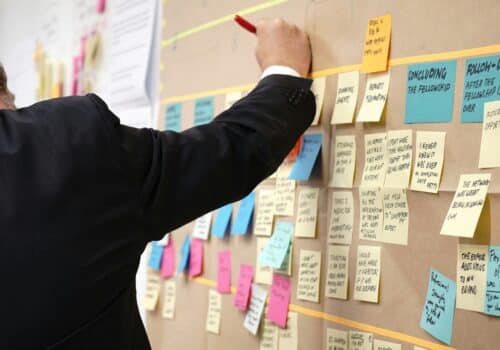Do You Need an ERP System? The Answer Might Surprise You
The marketing experts tell me that I’m supposed to play devil’s advocate when it comes to the topic of ERP systems. I’m supposed to tell you that maybe you don’t need one — that only special businesses need one — and I’m supposed to tell you that yours is a special business.
Hype and half-truths don’t help Syte’s manufacturing clients grow their businesses, however. It doesn’t help the leadership of family-owned businesses manage rapid change, or help their employees be more productive.
The truth is that your growing company isn’t special — but it is unique. Like any growing business, at some point you’ll outgrow your systems and processes — but how you change what you’re doing is unique to you.
I believe in open communication and transparency, so here’s the reality as I’ve seen it in my many years of being an ERP consultant:
The question isn’t “if” you need an ERP system — it’s when.
Most growing manufacturing companies we talk to come to us because they know they need an ERP. They’ve simply outgrown their current systems. The questions that remain are:
- Is now the right time to implement an ERP?
- Are you ready for an ERP system?
- Can you put off a big ERP implementation project a little longer without impacting your ability to grow and scale the business?
This is why we always start by conducting a comprehensive As-Is Business Process Analysis for new clients. It answers those important questions, but it also results in two other major benefits for the company even before they implement an ERP system.
1. A Process Assessment Improves Your Processes — and Brings Your People Together
Taking the time to talk through your current processes with your people is an outstanding opportunity for cross-functional collaboration and builds stronger relationships within your company. As your people connect, they will be able to more easily identify what’s working and what needs improvement.
Connected teams/people inspire, create and innovate. They are change makers!
When we help our clients map out their current business processes, we pull their people together so they can share their experiences with us and with each other. Then to document these processes, we look closely at inputs, actions, outputs, people and time.
Let’s use the Procure to Pay process as an example.
- There is an internal demand for materials, and the requestor sends an email or requisition document to a buyer within the organization. This requisition is an input into the purchasing action.
- The buyer’s action is to purchase the requested material from an outside supplier, and their output would be the purchase order that is then sent to the supplier.
- The people in the mix include a requisitioner, buyer, supplier, receiver, accounts-payable clerk, and likely someone who approves the final payment.
- As we look at each transaction within the larger business process, we consider the amount of time each step takes as well. Time is an indicator of cost, and wear and tear on people, among other things.
Process assessment is the first step in an ERP implementation project, but it has standalone value as well. It reveals better and more efficient ways to do things — and many of these process improvements can be executed before an ERP system is even chosen.
2. A Process Assessment Lays the Groundwork for a Successful ERP System Implementation
For each process we map out during the process assessment phase, we have our clients ask their teams: What is the most important thing that this process must accomplish for us?
Often this question results in more than one answer. The point of it is to drill down to what matters most, however. This is important because we must have this single, driving goal in mind during the mapping process to be intentional about where to focus the team’s energy and efforts to deliver the biggest return on the improvements.
As we help our clients deeply explore each process, we look for:
- Where are the manual steps?
- Where is an inordinate amount of time being spent?
- Where are the bottlenecks?
- Where are mistakes being made?
And you guessed it — these are critical questions to answer when selecting the right ERP solution as well. Documenting these processes also illuminates anything that’s industry- or business-specific, that might require a more niche ERP system or unique optimizations.
The process assessment benefits the organization by giving everyone more clarity, and it lays the foundation for the entire ERP selection and implementation process, too.
Put Process Before Technology
Do you need ERP? Yes. Do you need it now? Maybe.
An ERP system can do some heavy lifting in terms of saving your organization time, money, and wear and tear on your people. If your company is growing, or has already grown beyond its current systems, there’s really no alternatives — it’s time to consider an ERP. But there are alternatives to how and when you choose and implement that system.
The first step to knowing when and how to implement an ERP system, is an As-Is Business Process Analysis. Completing an assessment of current core business processes — or even just one key process you know is wrought with inefficiencies — can provide massive insights into where your company’s biggest challenges lie.
I’d love to share some stories with you about how companies we’ve worked with have gone through this process, and what additional benefits they’ve seen. Reach out and let’s talk!
ERP Readiness Self-Assessment
Is your organization ready for a new or upgraded ERP solution? Find out with this complimentary self-assessment.
Doing Business Better
You strive for excellence, believe in your people, and want to do things right the first time. And you know that you need help to get to the heart of your business challenges and make the best choices for the future of your privately held manufacturing and distribution company. That’s where we come in.
We help you focus and find exactly the right path to accelerated growth and sustainable success — from your people to your processes to your ERP software.



